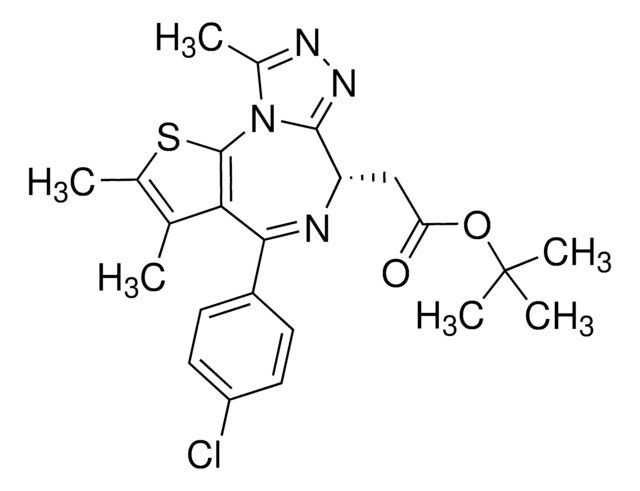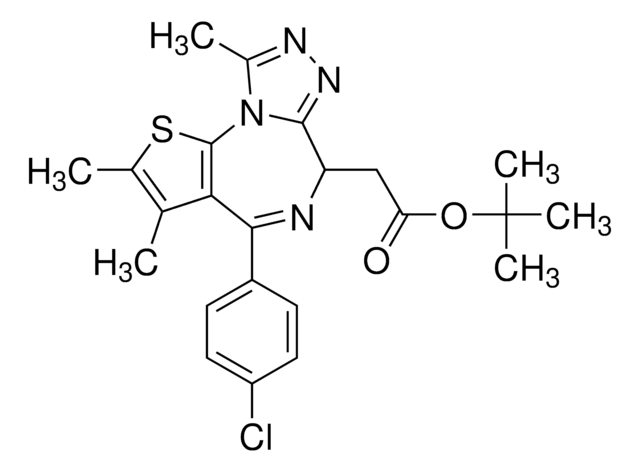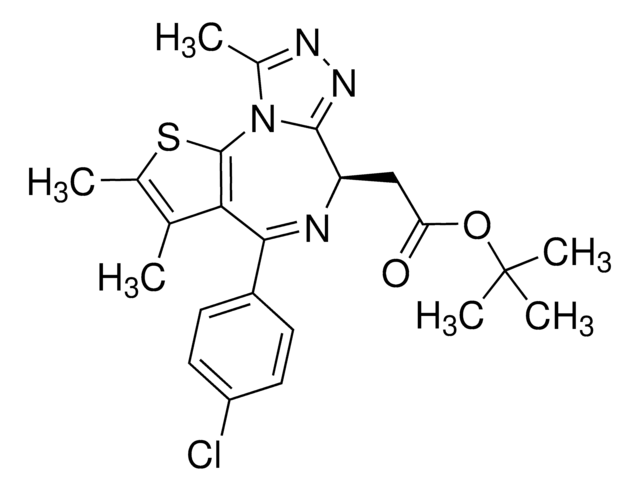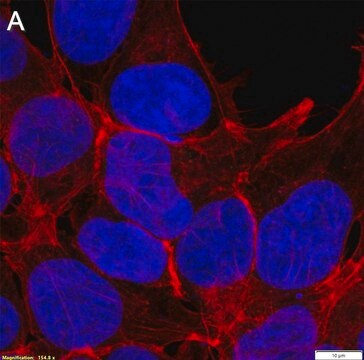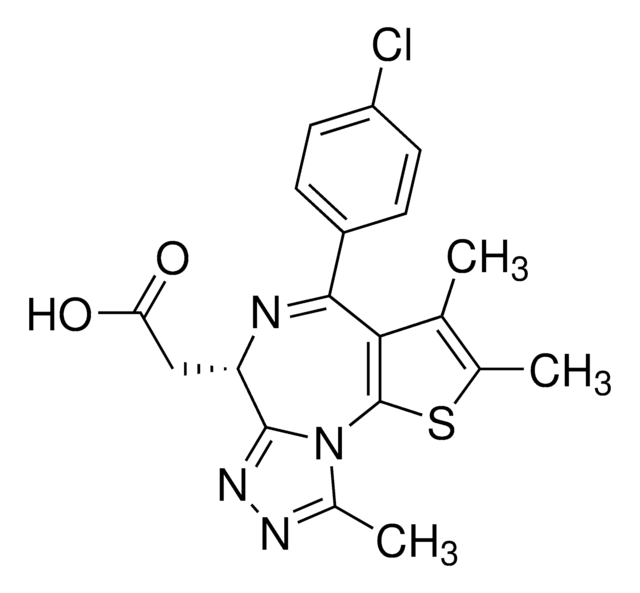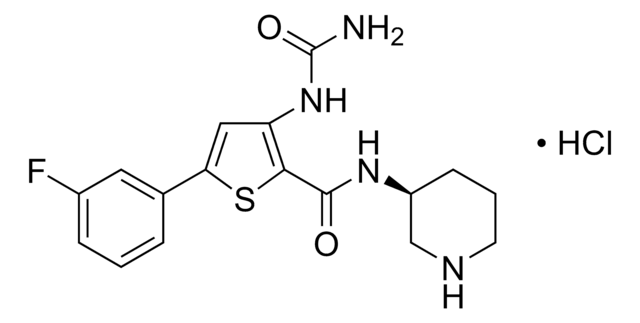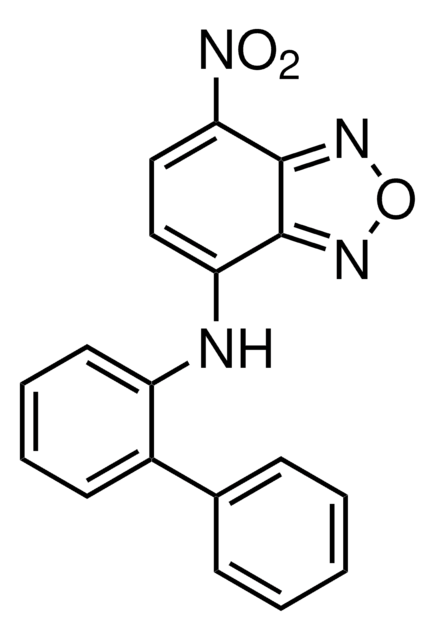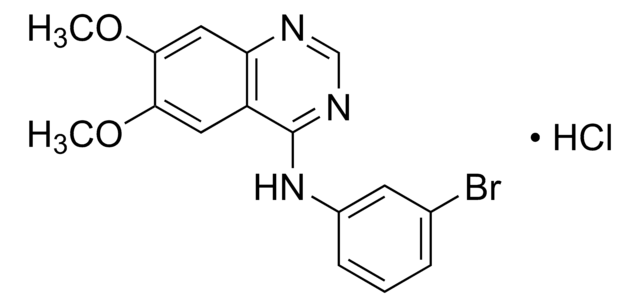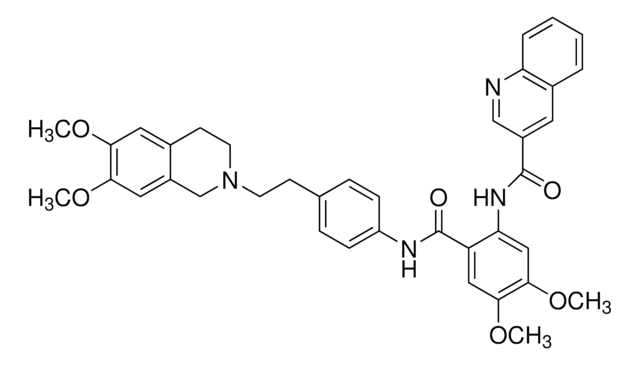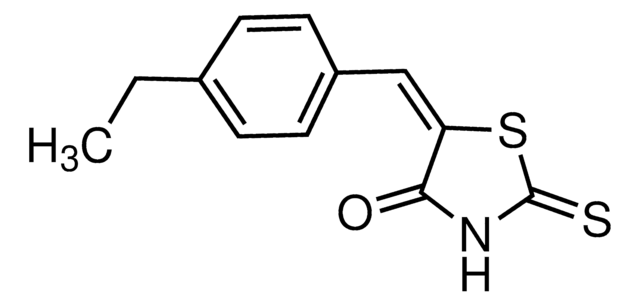おすすめの製品
品質水準
アッセイ
≥98% (HPLC)
形状
powder
色
white to beige
溶解性
DMSO: 20 mg/mL, clear
オーガナイザー
GlaxoSmithKline
関連疾患
cancer
保管温度
2-8°C
InChI
1S/C23H21N5O3/c1-12-21(14(3)31-27-12)16-9-18-15(10-20(16)30-4)22-19(11-25-18)26-23(29)28(22)13(2)17-7-5-6-8-24-17/h5-11,13H,1-4H3,(H,26,29)/t13-/m1/s1
InChI Key
VUVUVNZRUGEAHB-CYBMUJFWSA-N
アプリケーション
GSK1210151A(別名:I-BET151)は、MLL(混合型白血病)融合白血病の治療におけるクロマチンへのBET(ブロモドメインと余剰末端)の動員に対するその阻害効果を調べるために使用されてきました。
生物化学的/生理学的作用
GSK1210151A(I-BET151)は、アセチル-リジン認識クロマチンアダプタータンパク質のBET(ブロモドメインおよびエクストラターミナル)タンパク質ファミリーの阻害剤です。GSK1210151Aは、クロマチンからBRD3やBRD4、PAFcやSECのコンポーネントを置換することにより、混合型白血病(MLL)の発症に関与する主な遺伝子(BCL2、C-MYC、CDK6)において転写を阻害します。GSK1210151A(I-BET151)は2つのMLL動物モデルにおいて良好な有効性が確認されました。
その他情報
GSK1210151Aは、専門家による審査を受け、Chemical Probes Portalにより推奨されてます。詳細情報については、Chemical Probes PortalウェブサイトのGSK1210151Aプローブの要約をご覧ください。
シグナルワード
Danger
危険有害性情報
危険有害性の分類
Acute Tox. 3 Oral
保管分類コード
6.1C - Combustible acute toxic Cat.3 / toxic compounds or compounds which causing chronic effects
WGK
WGK 3
引火点(°F)
Not applicable
引火点(℃)
Not applicable
適用法令
試験研究用途を考慮した関連法令を主に挙げております。化学物質以外については、一部の情報のみ提供しています。 製品を安全かつ合法的に使用することは、使用者の義務です。最新情報により修正される場合があります。WEBの反映には時間を要することがあるため、適宜SDSをご参照ください。
Jan Code
SML0666-BULK:
SML0666-25MG:
SML0666-5MG:
SML0666-VAR:
試験成績書(COA)
製品のロット番号・バッチ番号を入力して、試験成績書(COA) を検索できます。ロット番号・バッチ番号は、製品ラベルに「Lot」または「Batch」に続いて記載されています。
この製品を見ている人はこちらもチェック
Replication Study: Inhibition of BET recruitment to chromatin as an effective treatment for MLL-fusion leukaemia.
Shan X, et al.
eLife, 6, e25306-e25306 (2017)
Zhongyuan Gao et al.
Cancer biology & therapy, 19(5), 407-415 (2018-01-16)
Lung cancer is the leading cause of cancer-related death worldwide. Bromodomain and extraterminal domain (BET) proteins act as epigenome readers for gene transcriptional regulation. Among BET family members, BRD4 was well studied, but for its mechanism in non-small cell lung
Lisa-Maria Winter et al.
Scientific reports, 13(1), 12061-12061 (2023-07-27)
GDF15 has recently emerged as a key driver of the development of various disease conditions including cancer cachexia. Not only the tumor itself but also adverse effects of chemotherapy have been reported to contribute to increased GDF15. Although regulation of
Yan-Yi Jiang et al.
Gastroenterology, 159(4), 1311-1327 (2020-07-04)
We investigated the transcriptome of esophageal squamous cell carcinoma (ESCC) cells, activity of gene regulatory (enhancer and promoter regions), and the effects of blocking epigenetic regulatory proteins. We performed chromatin immunoprecipitation sequencing with antibodies against H3K4me1, H3K4me3, and H3K27ac and
Jun Li et al.
Cell reports, 37(11), 110124-110124 (2021-12-16)
Regulatory T (Treg) cells play crucial roles in suppressing deleterious immune response. Here, we investigate how Treg cells are mechanistically induced in vitro (iTreg) and stabilized via transcriptional regulation of Treg lineage-specifying factor Foxp3. We find that acetylation of histone tails
ライフサイエンス、有機合成、材料科学、クロマトグラフィー、分析など、あらゆる分野の研究に経験のあるメンバーがおります。.
製品に関するお問い合わせはこちら(テクニカルサービス)